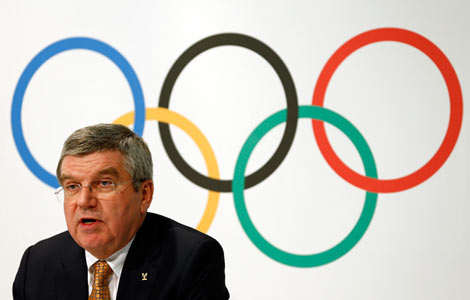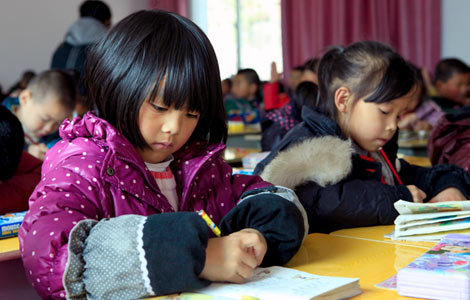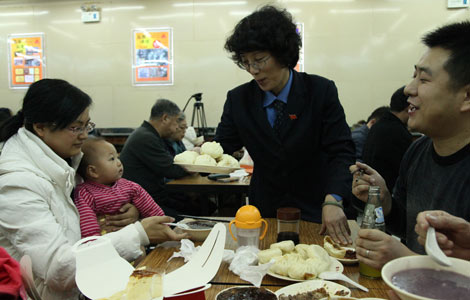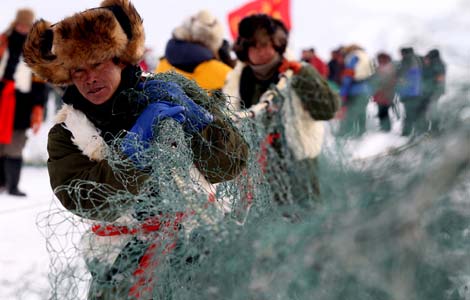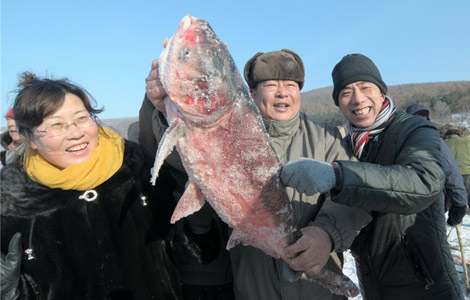Beijing turns cold shoulder to Japan
Updated: 2014-01-01 00:35
By Li Xiaokun in Beijing, Cai Hong in Tokyo and Zhang Yuwei in New York (China Daily)
|
||||||||
Beijing has declared Japanese Prime Minister Shinzo Abe "not welcome" by the Chinese people and said Chinese leaders won't meet him.
It is China's toughest stance since tensions flared last year between the Asian powerhouses over China's Diaoyu Islands.
Analysts said Abe must apologize for his visit to a shrine honoring war criminals and promise not to visit it again if he really wants to mend ties with neighbors.
"It is Abe who has shut the door on talks with Chinese leaders," Foreign Ministry spokesman Qin Gang said at a daily news briefing on Monday, referring to Abe's Dec 26 visit to the Yasukuni Shrine, which honors 14 Class-A World War II criminals.
"Since assuming office, Abe has miscalculated China-Japan ties and made one mistake after another," Qin said, calling the war criminals fascists and Nazis of Asia.
During his visit to the shrine, the first by a sitting Japanese prime minister since 2006, Abe said that relations with China and South Korea were important and he hoped "for an opportunity to explain to China and South Korea that strengthening ties would be in the national interest".
Liu Jiangyong, an expert on Japanese studies at Tsinghua University, said, "As the international community has questioned Abe's visit, an apology or a promise of no more visits will be more sincere than his offer for explanation."
Abe's call for a chance to explain the matter is an attempt to put the ball back into the court of China and South Korea, he said.
Qin said that doors will remain open for people-to-people exchanges.
David Fouquet, president of the European Institute for Asian Studies, said any prospects of dialogue between Chinese and Japanese governments may enter a frosty period comparable to that during the administration of former Japanese Prime Minister Junichiro Koizumi, who had no direct contact following his repeated visits to the shrine.
As for China-Japan ties, "more emphasis should therefore be placed on business, cultural and personal contacts", he said.
Chinese community leaders the in the US organized events over the weekend and on Monday to condemn Abe's shrine visit.
"It's the common interest and responsibility for both Chinese and American government and people to fight against the actions by Abe," Gary G. Xie, executive chairman of Council of Chinese-American Association New York, told China Daily at the association's press event on Monday to condemn Abe's provocative visit.
Xie said he hopes the Chinese government takes a hardball attitude towards Japan.
"Militarism is integral in Japan's nature. We cannot expect them to change. Therefore our effort against it should be lasting too, even at the cost of economic benefit," said Xie.
Right-wing trend

In a fresh sign of right-wing forces rearing their heads in Japan, the Japan Restoration Party, the country's second-largest opposition party, is planning to launch a signature initiative throughout the country in 2014 to ask the Japanese government to withdraw the 1993 statement by Japan's former chief Cabinet secretary Yohei Kono.
The statement acknowledged that comfort women were coerced by the Japanese army and offered an apology expressing Japan's remorse over the issue.
The signature campaign argues that the Kono statement defiles Japan's image.
Contact the writer at yuweizhang@chinadailyusa.com
Mo Jingxi in Beijing, Li Xiaofei in Brussels, and Wan Li in New York contributed to this story.
Most Viewed
Editor's Picks

|

|

|

|

|

|
Today's Top News
US analysts think Abe's shrine visit a mistake
Xi's bun shop visit wows media
Global retirement crisis looms
US train collision sparks fire
Beijing turns cold shoulder to Japan
70 journalists killed on the job
Xi to direct carrying out of reform
Abbas committed to peace talks
US Weekly

|

|

